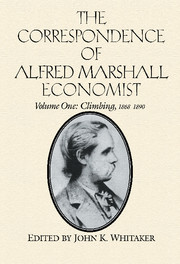Book contents
- Frontmatter
- Contents
- Acknowledgements
- General Introduction
- Editorial Practices
- Alfred Marshall: A Sketch
- Abbreviations
- List of Manuscript Collections
- Biographical Register
- Chronology 1842–1890
- List of Letters Reproduced in Volume 1
- LETTERS 1–332
- Appendices
- I Alfred Marshall's Family
- II Marshall's Testimonials for the Principalship of University College Bristol, June 1877
- III Foxwell's Initiative
- IV The 1889 Debate on Reform of the Moral Sciences Tripos
IV - The 1889 Debate on Reform of the Moral Sciences Tripos
Published online by Cambridge University Press: 29 March 2010
- Frontmatter
- Contents
- Acknowledgements
- General Introduction
- Editorial Practices
- Alfred Marshall: A Sketch
- Abbreviations
- List of Manuscript Collections
- Biographical Register
- Chronology 1842–1890
- List of Letters Reproduced in Volume 1
- LETTERS 1–332
- Appendices
- I Alfred Marshall's Family
- II Marshall's Testimonials for the Principalship of University College Bristol, June 1877
- III Foxwell's Initiative
- IV The 1889 Debate on Reform of the Moral Sciences Tripos
Summary
The Senate debate of 7 March 1889 on the Report of the Special Board for Moral Sciences led to the following remarkable interchange between Cunningham, Marshall and Sidgwick {Reporter, 19 March 1889, pp. 593–6). This interchange is interesting not only for the substantive differences revealed, but also because it highlights issues that were to dog the continuing debate on curricular reform until the position of economics was finally settled by the establishment in 1903 of a new Tripos in Economics and Politics. The Report being discussed recommended that the two Parts of the Moral Sciences Tripos be made independent, and that those specializing in economics for Part II be permitted to substitute Political Philosophy for the otherwise-required subject of Metaphysics (see [229.3, 231, 235.5]).
Dr. Cunningham … objected to the regulation which allowed the substitution of Political Philosophy for Metaphysics in the case of Economic students who took up the second part of the Tripos. The reason alleged for this special arrangement was that Political Economy was independent of Metaphysics and that those who engaged in the study of Political Economy need not necessarily make any great advance or take any great interest in Metaphysics. It seemed to him that in the interests of Political Economy as a study, it was unfortunate so to accentuate a severance of this kind: so far as he could judge of Political Economy in the present day, there were a great many Metaphysical questions underlying it, and those who went out to the world as specialists in it should have some insight into the treatment of these Metaphysical questions.
- Type
- Chapter
- Information
- The Correspondence of Alfred Marshall, Economist , pp. 363 - 366Publisher: Cambridge University PressPrint publication year: 1996



